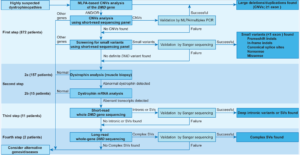Duchenne muscular dystrophy, the most common muscular dystrophy, and its other allelic forms of dystrophinopathies are caused by mutations in the DMD gene. Some patients with dystrophinopathies remain genetically undiagnosed after DNA-based routine genetic testing, most likely due to rare deep intronic variants and complex structural variants. To address this, we investigated DMD-related dystrophinopathies by using a stepwise genetic testing strategy (SGTS) which implements various molecular technologies. SGTS combines routine genetic testing followed by a more comprehensive evaluation of DMD for unsolved patients, including the stepwise analysis of dystrophin mRNA, short-read whole-gene DMD sequencing, long-read whole-gene DMD sequencing, and in silico bioinformatic analyses. Our full testing pipeline yielded a genetic diagnostic rate of 99.86% in 726 patients with dystrophinopathies and was also successful in identifying complex structural variants and intronic variants affecting splicing. (By Dr. Zhiying Xie, https://jmg.bmj.com/content/early/2020/09/25/jmedgenet-2020-107113 )
A practical approach to the genetic diagnosis of unsolved dystrophinopathies: a stepwise strategy in the genomic era
(Visited 709 times, 1 visits today)
